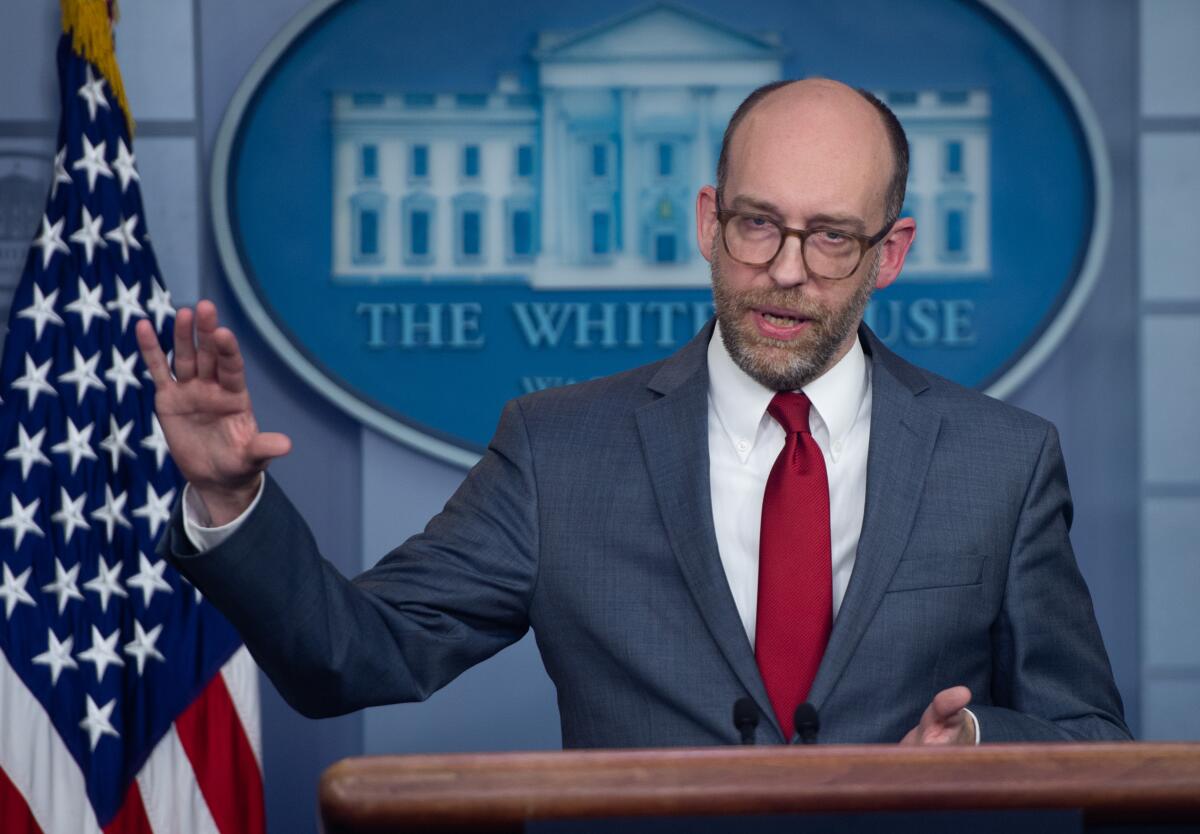Trump once vowed to wipe out the federal deficit. Now he’s just pretending

- Share via
Washington — “Promises made, promises kept” has been one of President Trump’s frequent boasts in his campaign for a second term.
So it was a little awkward this week when his own proposed budget acknowledged, in the fine print, that several of his key promises haven’t been kept at all.
When Trump ran in 2016, he promised that if Congress enacted big tax cuts for corporations, economic growth would soar to 4% or more. “I actually think we can go higher,” he said.
He promised to balance the federal budget in eight years, a longstanding Republican aim that those economic growth rates could make possible.
Neither goal is being met — not even close.
In 2017, a Republican Congress approved Trump’s corporate tax cut.
It gave the economy a boost, but only a temporary one. Growth reached 2.9% in 2018 but slowed to 2.3% last year. It’s running about 2% now, according to private-sector economists.
That has extended the long economic expansion that began under President Obama, as well as reduced unemployment and raised wages — all good things.
But it’s far short of Trump’s initial 4% promise, and it’s done nothing to balance the federal budget. Quite the contrary; Trump’s tax cut ballooned the deficit by about $1 trillion a year — and his new budget forecasts that pace to continue.
To which Trump’s budget chief said as he unveiled the new budget this week: Never mind.
“This president is a “promises made, promises kept” kind of president,” Russell Vought, the acting director of the Office of Management and Budget, told reporters.
The promises are still there, he said. They’ve just been scaled back.
They’re also still wildly unrealistic. Trump’s proposed budget forecasts 2.8% growth this year, growing to a steady 3% after that. Those numbers are way above reputable economists’ estimates.
With 3% growth, Vought said, the federal budget could come into balance 15 years from now, in 2035. That’s 10 years later than Trump promised, but who’s counting?
His pie-in-the-sky growth number is what budgeteers call a “magic asterisk” — a statistical device that allows a president to claim that he’s meeting his goals even when he’s not. Obama and earlier presidents used them too.
But Trump’s election-year budget plan uses a second magic asterisk to made the deficit look better.
It assumes that the Federal Reserve will keep interests low for the next 10 years, which will reduce the cost of interest on the national debt. That’s a wish more than a forecast.
And a third magic asterisk, maybe the biggest: It assumes Congress will enact all of Trump’s proposed cuts in domestic spending, from Obamacare and Medicaid to environmental protection and the Centers for Disease Control and Prevention.
That’s not going to happen. House Democrats have promised to resist draconian cuts in the social safety net, health and the environment, just as they did last year and the year before.
Republicans in the Senate have rejected many of Trump’s proposals, too, including cuts in farm subsidies and foreign aid.
Many of his domestic spending proposals represent other broken promises.
When he ran last time, Trump pledged he would not touch Medicaid. He promised to replace Obamacare with a better, cheaper health insurance plan. He vowed to protect clean air and clean water. He’s done none of those things.
Presidents’ budgets are often little more than a wish list that Congress politely ignores. But Trump’s new budget, with that mountain of magic asterisks, is wholly untethered from reality.
But maybe that’s not the point. As Trump reportedly told campaign donors last month, “Who the hell cares about the budget?”
His 2016 campaign promises were always unrealistic. You can’t cut taxes and balance the budget at the same time without cutting spending so deeply that even Republicans will blink.
So Trump blames Democrats for failing to embrace the Republican agenda of gutting domestic programs.
“We have not been able to make progress … because Democrats in Congress have opposed his previous budgets,” Vought said. “We hope that changes. We probably need to have a national election before it does.”
Translation: If Trump wins a second term and the GOP takes control of the House, those budget cuts will begin to look possible.
Many moderate Democrats want to be fiscally responsible, just as Republicans once were (and still might be, under a different president).
But if a Democrat wins the White House, the first thing GOP leaders in Congress will do is demand a balanced budget and claim that Democrats are responsible for the $1-trillion deficit Trump bequeathed them.
All the Democratic presidential candidates say they would reverse Trump’s tax cuts. Republicans will say it’s bad for growth and unfair to hardworking corporations. They’ll claim the only way to reduce the deficit is to cut domestic spending.
Don’t listen. Trump’s fantasy budget proposal shows how cynical that argument is.
More to Read
Get the L.A. Times Politics newsletter
Deeply reported insights into legislation, politics and policy from Sacramento, Washington and beyond. In your inbox twice per week.
You may occasionally receive promotional content from the Los Angeles Times.











